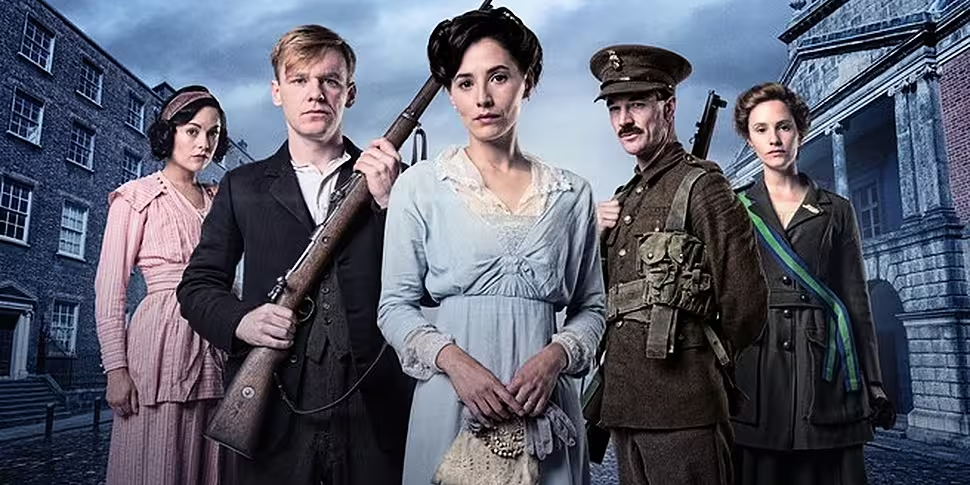A century ago, a group of patriotic and idealistic Irishmen and women took to the streets of the British Empire’s second city, home to the worst slums and tenements in all of Europe, to declare Ireland a Republic. Gathering in front of the General Post Office on Sackville Street, now known as O’Connell Street, Pádraig Pearse read out their message to the people of Ireland, and the rest of world, demanding “unfettered control of Irish destinies, to be sovereign and indefeasible.”
Hopelessly outmatched, shoddily organised, these revolutionaries took their stand, fully acknowledging the failure of the Irish people to shake off the shackles of colonialism over three centuries, calling out the “long usurpation” of Irishmen and Irishwomen by an uncaring foreign people.
But that long history of oppression and the indistinguishable republican zeal of those who laid down their lives for the formation of this country all counts for nothing, as Rebellion would have us believe the whole shebang comes down to a secretary in Dublin Castle feeling cock blocked by her adulterous boss’ posho wife. He’s a man so stiff-upper-lipped he looks like he was born with a silver spoon up his rear end, but hell hath no fury like a woman scorned, so tear down 800 years of imperial rule, May says, if she can’t have him, they can’t have us.
Rebellion makes a wise decision with laying out the story of the Easter Rising with a cast of fictional men and women to get behind, with the household names of the movement reduced to cameos. That said, the heavy-handed duty to remind you of those heavy hitters’ significance means their guest appearances in the plot mean that Constance, James, and Pádraig become mythologised scene chewers, spitting out dialogue and showing our hopeless romantics how it’s done, whether that means holding a gun (“Like you mean it!”), or smack talking the no-good coppers (“Like you mean it!”), or indoctrinating young boys with the intoxicating allure of cross-curricular schoolwork on the modh conníolach and Molotov cocktail making (“Like you mean it!” [in subtitled Irish]).
The five-part series, of which the first episode was the most watched TV show last Sunday night, is written by Colin Teevan (Charlie, Single-Handed), who opens proceedings with an operetta in 1914. Our three little maids May (the secretary), Frances (the secondary school teacher and soon to be ‘shehadist’), and Liza (the Church of Ireland medical student and burgeoning socialist) sing in union and harmony, filled to brim with girlish glee, and ominously foreshadowing what’s to come with the Mikado lines “Everything is a source of fun / Nobody’s safe, for we care for none.”
War is declared and we jump forward to Easter 1916, and the only information we get to fill in the intervening gap is a black title card. Why are these women friends, beyond a one-time love of Gilbert & Sullivan? Why is Liza ready to give up her entire life as a well-to-do medical student for the sake of an Irish Republic? What does May see in her Brit toff? Why does Frances care so much about independence, and who the hell taught her how to ride a bike?
The answer to all of these questions, bar the intense concentration with which Ruth Bradley grips handlebars while pedalling across town, seems to come down to love. Or infatuation. May’s days as civil servant’s strumpet segue into Liza’s unspoken love for a bit of rough from the Dublin slums (Brian Gleeson), and Frances is in the thrall of Pearse. Only she displays any sort of feminist independence, and will almost certainly end up dying for her beliefs when things turn sour around episode five.
After introducing umpteen characters, providing almost no back story, not defining any of their motivations, but dressing them up in spiffy uniforms and nice wigs, Rebellion's opening salvo comes to slow and convoluted end, with the promise of some action in this weekend's second part. As we learnt from the events of Holy Week 1916, the best intentions of the performers, who here do their best with an underdeveloped script, sometimes aren't enough to pull off a rebellion.
Every Thursday, James talks Sean Moncrieff through what's making waves on the small screen this week. You can listen back to the podcast below:









